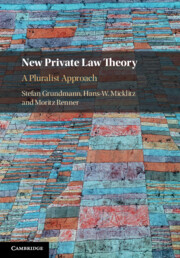Book contents
- New Private Law Theory
- New Private Law Theory
- Copyright page
- Contents
- Preface
- New Private Law Theory
- Part I Methods and Disciplines
- Part II Social Ordering, Constitutionalism and Private Law
- Part III Transactions and Risk: Private Law and the Market
- 11 Negotiation, the Function of Contract and the ‘Justice of Consensus’
- 12 Knowledge and Information
- 13 Private Power
- 14 Non-discrimination
- 15 Risk, Tort and Liability
- 16 Digital Architecture of Private Law Relations
- 17 Between Market and Hierarchy
- Part IV Persons and Organizations
- Part V Private Law (Rule-Setting) beyond the State
- Index
- References
11 - Negotiation, the Function of Contract and the ‘Justice of Consensus’
from Part III - Transactions and Risk: Private Law and the Market
Published online by Cambridge University Press: 09 April 2021
- New Private Law Theory
- New Private Law Theory
- Copyright page
- Contents
- Preface
- New Private Law Theory
- Part I Methods and Disciplines
- Part II Social Ordering, Constitutionalism and Private Law
- Part III Transactions and Risk: Private Law and the Market
- 11 Negotiation, the Function of Contract and the ‘Justice of Consensus’
- 12 Knowledge and Information
- 13 Private Power
- 14 Non-discrimination
- 15 Risk, Tort and Liability
- 16 Digital Architecture of Private Law Relations
- 17 Between Market and Hierarchy
- Part IV Persons and Organizations
- Part V Private Law (Rule-Setting) beyond the State
- Index
- References
Summary
This chapter addresses the function that negotiations and contracts fulfil in society (and in law) and explores the extent to which consensus is a source of legitimacy for legal effects (‘justice of consensus’) – including the negative side, the limits of the legitimacy of consensus. More in detail, this chapter is about three main sub-questions: justification(s) for freedom of contact and of its limitations; which kinds of particular limitations may be legitimate, namely whether and when redistribution is a legitimate goal, and how much rationality can be assumed or not and which reactions are advisable in case of biases. One particular prerequisite for ‘free’ decision-making – free in a meaningful way, that is, information – is dealt with in Chapter 12.
- Type
- Chapter
- Information
- New Private Law TheoryA Pluralist Approach, pp. 207 - 229Publisher: Cambridge University PressPrint publication year: 2021

